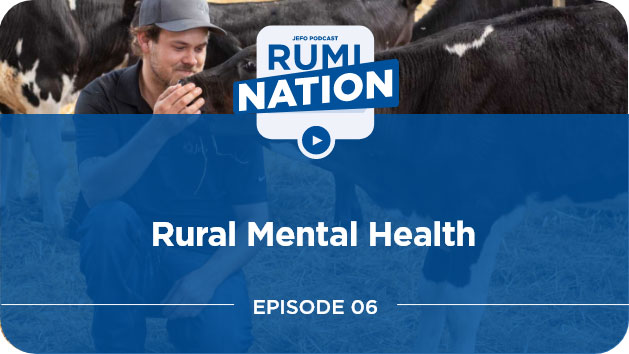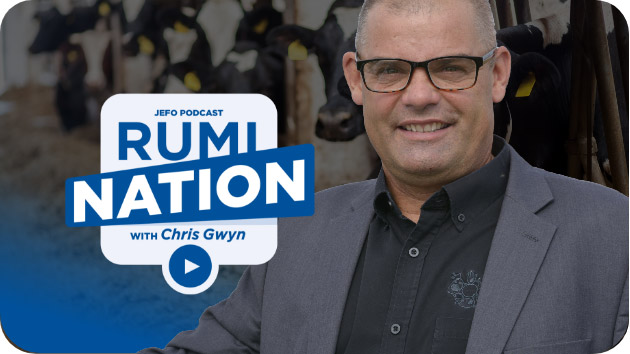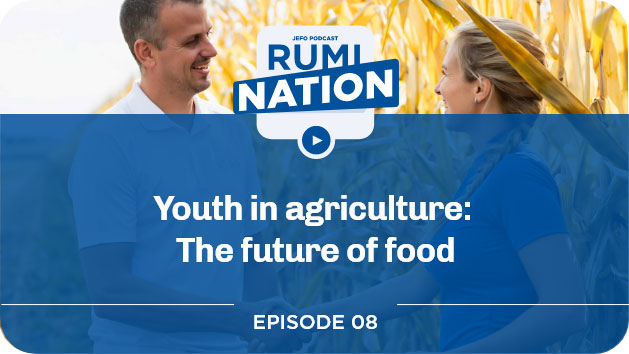RumiNation | S04 : E07
Mineral Recommendations in Dairy Cattle
Brought to you by Jefo Nutrition
Share now!
Did you enjoy this episode?
Share now!
Our guest - Dr. Bill Weiss
Dr. Weiss was a Professor and Extension Specialist of dairy cattle nutrition at The Ohio State University, but after more than 33 years on faculty, he retired in early 2021. His main research areas were factors affecting digestibility by dairy cows, relationships between minerals and vitamins and the health of dairy cows, and developing methods to incorporate cow and diet variability into ration formulation.

Timestamps & Summary
2:59
I was wondering if you could review some of the highlights for the audience to remind us of those key important areas.
Dr. Bill Weiss
For most minerals, what the committee tried to do is start at the cell. And we calculate, for example, how much mineral goes out and milk, how much mineral is free if an animal is growing, how much mineral is in that new tissue, and if she’s pregnant, how much mineral is being deposited in the fetus, and we start there and we sum all that up. […]
8:29
What can you tell the audience today about the impact of mineral nutrition, whether positive or negative on the gut microbiome, and perhaps where some of the research should be focusing?
Dr. Bill Weiss
Bacteria need minerals, just like humans and cows need them. And we’ve known that for a long time so that the fact we have to feed the rumen bugs and the intestinal bugs in cows is well established. And in general, if you feed enough to the cow, the bacteria usually add enough and that’s kind of where we left it. But more recently, there’s been more and more studies looking at sources, not necessarily the amount of trace minerals but the source of the trace mineral. For example, organic versus sulfates or hydroxy versus sulfates, and so on. And some things we’re finding at what I call the gross level is trace mineral affects fiber digestion, and fiber is digested only by bacteria so if you’re altering fiber digestion, likely you’re changing the room and population of bacteria. […]
13:09
What is a nutritionist should be looking for when looking to add chromium to a ruminant diet and the sources that they’re utilizing?
Dr. Bill Weiss
I don’t know other countries’ rules and regulations. But in the US, chromium propionate is the only one that’s been approved. This is regulated by FDA because they’re worried. I think they’re most worried about environmental issues. But certain terms of chromium are also toxic. The form that we feed is not or not highly toxic. Other forms of chromium can actually be quite toxic. So, it’s regulated in the US at point five milligrams per kilogram is the supplemental right. […]
Chromium is one of these nutrients… We know cows need it. Because we can find proteins or substances within animals, not just cows, people, etc. that require chromium to work. But in the new NRC, which is now called NASEM, we don’t give a recommendation for chromium. And people say: Well if it’s an essential nutrient, why don’t you do that? Well, part of the problem is no one’s ever identified a chromium deficiency. A lot of cows are not fed supplemental chromium and they live very productive happy lives. So, it’s if you can’t produce a clinical deficiency, it’s hard to say this is a requirement. Part of the problem is feeds have chromium. […] Measuring chromium in feeds is really hard. So, we have very poor data on actual chromium concentrations. […]
18:50
What are maybe three or four key take-home messages you’d like to leave the audience when they’re thinking about mineral nutrition at the farm level that they need to consider?
Dr. Bill Weiss
One of the first things is, and I see a lot of diets and minerals are needed but too much is too much. And very often they’re over-supplemented grossly in both minerals and vitamins. And this adds cost but these metals at some of these absurd levels are detrimental. […]
The other thing is source does matter. As we do more and more stuff, the data is I think clearer on zinc than the other trace minerals that organic zinc or zinc from non sulfate sources, does things that zinc sulfate doesn’t. […]
So, look at everything: water, mineral composition, your basal diet, and make decisions on sources based on those things. But I guess the biggest thing is: be reasonable. And both feed enough but don’t feed too much.







